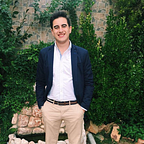Brave New World — Book Thoughts
In a galaxy not so far away, in a time not so distant from ours…
The, arguably, best novel by Aldous Huxley tells us about what Huxley thought would be the world in a few years, a dystopia. Brave New World (BNW) was published in 1932, a couple of years before the start of WW2. The dystopian novel was greatly inspired by 1984, “Nineteen eighty-four”, the acclaimed novel of George Orwell who greatly inspired Huxley to write BNW.
SPOILERS AHEAD!
Community
Brave New World mainly focuses on describing the Central London Hatchery and Conditioning Centre (CLHCC) which is where the society of London in 632 AF (After Ford/Freud) comes from, basically. If you are conditioned to act, think, and live in a certain way from the moment you are born. Most likely you will always be happy as long as you don’t stray from those types of behaviors. In the real world, we all are conditioned as well but in a “softer” way. Our parents, siblings, family, government, or even political parties condition our way of thinking. If your dad tells you must play sports and exercise then most likely you will. If your mother spends all evening watching TV then most likely you will find happiness in doing that. The difference between the world of BNW and the real one is that you can “escape” from that conditioning if you want. Most of the time you are not forced to watch TV at night with your mother or play the sports your father tells you to and of course, as a baby, they weren’t whispering to your ear to like specific things or trying to implant a way of living life, unlike Huxley’s novel which repeated the same sentences countless times to newborns and children to turn the population into brainless robots.
Identity
Bernard Marx, besides John, was the closest we got to someone with some kind of consciousness. Bernard did something that Lenina or Henry (his alpha co-workers) couldn’t do. He thought about what surrounded him and couldn’t come to accept all of the sex, soma, and the no boundaries to desire things. He also enjoyed being alone, unlike every other human being in Huxley’s dystopian novel. Because of this way of thinking, Bernard was often referred to as strange, which is basically what happens most of the time nowadays when someone chooses to have a somewhat different way of living than the rest of us. Of course, that depends on our interpersonal relationships but we all have assumptions on what is “normal” to do and to Lenina, it was awkward that Bernard liked to watch the night sky, be silent, and alone.
Despite all of this, when Bernard sees an opportunity to be popular and loved by everyone he quickly embraces it and forgets what he used to be, to have women, power, and recognition. This twist in Bernard’s way of thinking and acting shows us the level of ambition the upper classes of that society, as well as how much they want approval and fulfillment of all the desires they have, almost reminiscing of how we live now. Nowadays some people don’t care about what they have to do, as long as they get what they want just so they can show everyone what they’ve accomplished and feel good about it.
On the other hand, we have John, the Savage, or Mister Savage which resembles us. John is the more relatable character of all the book because his surroundings are pretty similar to ours. He didn’t grow in the city where all the “progress” is. When allowed to visit London, John doesn’t hesitate and goes. After arriving, John is seen as a piece from a museum used by Bernard to achieve greater heights and establish new contacts. Sees his mother Linda go deep into soma and later dying to it. His love for Lenina grows into some kind of obsession and quickly turns into hate and disgust when John realizes she only sees the physical part of love and doesn’t understand feelings and monogamy due to her surroundings. Love and commitment just don’t exist in Lenina’s world.
Ultimately, John renounces to modern society and goes into exile or at least tries. When the people from London find out where he is staying they quickly turn “his place” into a sort of Zoo, leading to his suicide maybe because of all the lack of humanity he found in this “Brave World” he so desperate aspired to live in and experience.
Stability
BNW implemented a strong question in me, “who are the savages in our, sometimes Brave World?”. Do we discriminate against a certain type of person (besides race or ethnicity)? (Due to the castes) Maybe our ambitions only make us another alpha. The conditioning we get from media and our society perhaps turn us into zombies filled with stupidity and never-ending desires. We already have soma as a matter of fact. We have everyday drugs that help us get through tough situations, help us sleep, make us not think about our problems, and relax. Drugs that are disguised as apps on our smart TVs or smartphone. The majority of our society lives inside smartphones, through some online fantasy that they show every day on social media, not thinking about what they’ve watched, read, or seen.
It’s just as if we live in a world where most of the population doesn’t care about science, art, or knowledge overall, just as our friends from BNW where they “canceled” all of the “classic” forms of art to erase all kind of ancient thoughts that existed a long time ago. Thoughts of rebellions, love, and suffering. Feelings that were forgotten in Huxleys London so everyone could always be happy.
What is your soma? Can you see through all your ambitions or are you just another Bokanovsky twin?
For the ones that aren’t fans of books 👇
